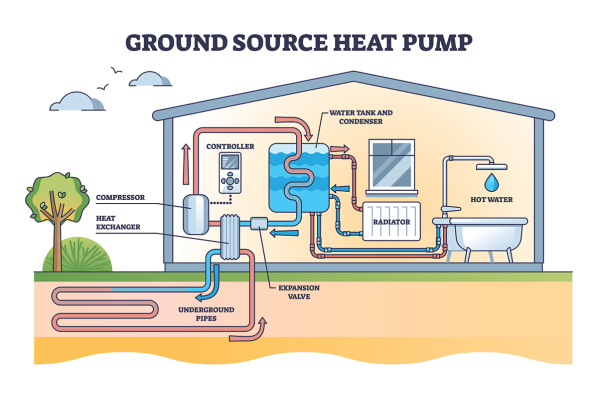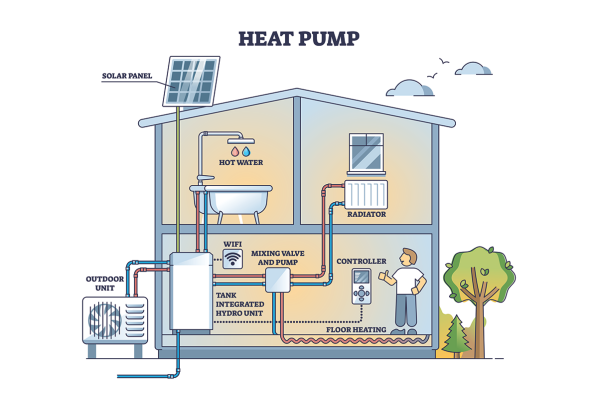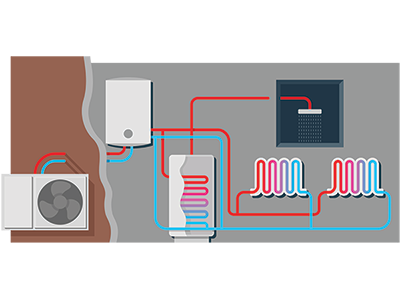Should I Buy a House With a Heat Pump?
Heat pumps will be increasingly common when buying a house due to their more energy-efficient running and potential for cost savings from energy bills.
Heat pumps are three times more energy efficient than traditional gas boilers, reducing your home's carbon footprint. The Government claims bill savings of around £100 per year compared to a gas boiler if used effectively with a smart tariff.
As part of the Government’s Future Homes Standard, natural gas boilers will be banned in newly built homes starting in 2025. Developers must install a low-carbon heating system, like heat pumps. The Government has set a target of 600,000 heat pump installations by 2028.
With such a focus on change, what must you check when buying a home with a heat pump? What checks do your conveyancing solicitor and RICS surveyor undertake? What happens if the heat pump is faulty? Is the seller liable if they don't report any issues? This article explains in more detail what you must look for when buying a home with a heat pump.
How does a heat pump work?
A heat pump uses electricity to transfer heat into or out of a building.
- 1 Warm air or water is pumped over the external heat exchange part of the heat pump.
- 2 This causes the refrigerant liquid inside the heat exchange to turn into gas.
- 3 The gas is moved into a compressor, which increases the pressure, causing the temperature of the gas to rise.
- 4 The heated gas is passed over the internal heat exchange to heat air or water which is pumped into the house.
- 5 As the heat is transferred, the refrigerant gas cools, returning to liquid state.
- 6 The cycle will continue on repeat until the temperature inside the house matches the setting on the thermostat.
Ground source heat pumps
Ground source heat pumps pass a mixture of water and antifreeze around a loop of underground pipes, where the natural heat stored in the ground is transferred to the liquid before it passes on to the external heat exchange to begin the cycle above.

Air source heat pumps
Air-to-Water heat pumps draw heat from the outside air using a fan to the external heat exchange to begin the cycle above. This option requires larger radiators or underfloor heating to increase the area for heat exchange inside the house, as it cannot achieve the high temperatures of a conventional gas boiler.
Air-to-Air heat pumps take heat from the air outside, condense the heat using the cycle above, and blow hot air inside the house. This warms the house but cannot provide hot water.

Which type of heat pump is better for homes in England and Wales?
Heat pumps have to work harder the colder the source. Ground source heat pumps are more consistent, as the soil temperature is usually above 5°C.
Air source heat pumps don't have to work very hard when the external temperature is only a few degrees below the desired internal temperature; they can operate effectively in extremely low temperatures, but become less efficient.
Because you will use the heating mostly when it is cold, opting for a ground source option is better. However, either option will be effective if you have a good design and installation, sufficiently sized radiators or underfloor heating, and you learn to operate the system optimally. Your installer will help you choose the best option for your home.
Why choose ground source
- More efficient with lower running costs.
- No outdoor unit.
- Costs around £15k - £50k.
Why choose air source
- Cheaper to install.
- Don't need garden space.
- Costs around £10.5k - £13.5k.
Should I buy a house with a heat pump?
Buying a house with a heat pump is a bonus. It generally means lower running costs, and you won't have to worry about upgrading in the near future. When considering a house with a heat pump, check to make sure:
- There is sufficient insulation.
- There are sufficient exchange surfaces, ie radiators and underfloor heating (for water systems).
- The pump's specifications, install date and maintenance history are in order.
- If the vendor can provide sample bills from the most recent winter, they are reasonable and in budget.
What does the solicitor do?
The solicitor will review section 12 of the property information forms, the certificate or guarantee from the installer, and conduct a local search to check if the pump is registered under building regs. They will raise enquiries to resolve any unanswered questions about the heat pump; some examples are:
- Is the heat pump system owned outright by the seller? (Is there a lease or finance agreement in place?)
- Was any noise assessment or acoustic test carried out as part of the installation?
- Have any performance checks (e.g. heat loss surveys, smart monitoring) been undertaken?
Do you need building regs for a heat pump?
Building regulations stipulate that you must install heat pumps at least 1m inside your property's boundary. This helps to minimise noise impact on your neighbours.
What does the RICS surveyor do?
"Surveyors must see the system running and ensure the floors and/or radiators heat up. I always recommend that the installer's details are passed to the buyers." - Guy Mattinson, MRICS.
- National coverage with local RICS surveyors.
- Rated Excellent on Trustpilot.
- We handle the booking.
- Same week availability.
What happens if the heating system is faulty?
The seller has to inform the buyer if the heat pump isn't working, much like they would a problem with a gas boiler. This will come up in the property information forms; lying on these documents is a criminal offence.
The Energy Act 2023
The Act enables the introduction of a new Low Carbon Heat Scheme, which places an obligation on the manufacturers of fossil fuel heating appliances to meet a rising standard for low-carbon heat pump sales as a proportion of their total appliance sales.
In September 2023, the Tories planned to grow the heat pump market to 600,000 installations annually by 2028. This target is critical to the UK's net-zero ambitions.
To achieve this, the Future Homes Standard will make the installation of heat pumps compulsory for new UK homes starting in 2025. Existing homeowners are not currently required to switch to a heat pump, but the government is offering significant incentives to encourage voluntary adoption.
A key planning restriction that heat pumps need to be one metre from a neighbour's property has been lifted as the government seeks to accelerate the take-up of the low-carbon technology. Source: BBC News
Get a grant for a new heat pump
You can get a government grant for up to £7,500 towards an air source or ground source heat pump or £5,000 towards a biomass boiler if you own the property and are replacing a fossil fuel heating system.
How to apply
- 1Contact MCS certified installers for quotes for the work.
- 2Your installer will confirm whether you are eligible.
- 3Agree a quote with your chosen installer.
- 4Your installer will apply for the grant, which will be taken off your installation bill.
Future Proofing: Your EPC Rating
Although a specific date is not yet set, the government are expected to introduce a minimum EPC rating of C or above for let dwellings, by 2030.
As your fossil-fueled heating systems reach the end of their lives, replacing your old system with an efficient, low-carbon, heat pump is a great way to improve the efficiency of the property, whether you intend to let it out, or want to keep your options open and maximise resale value in the future.
Caragh is an excellent writer and copy editor of books, news articles and editorials. She has written extensively for SAM for a variety of conveyancing, survey, property law and mortgage-related articles.
Andrew started his career in 2000 working within conveyancing solicitor firms and grew hands-on knowledge of a wide variety of conveyancing challenges and solutions. After helping in excess of 50,000 clients in his career, he uses all this experience within his article writing for SAM, mainstream media and his self published book How to Buy a House Without Killing Anyone.










